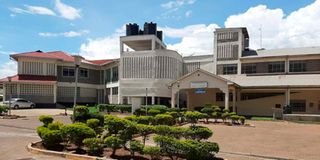AI to improve cancer treatment at Jaramogi Referral Hospital

Jaramogi Oginga Odinga Teaching and Referral Hospital (JOOTRH) where Mr Daniel Muthama practices as a biomedic.
What you need to know:
- Cancer is the third leading cause of death in the country after infectious and cardiovascular diseases. According to the data from the Ministry of Health, from 2012 to 2018, the annual incidence of cancer increased from 37,000 to 47,887 new cases.
- During the same period, annual cancer mortality rose almost 16 per cent, from 28,500 to 32,987 cancer-related deaths.
More than 5,000 patients who seek treatment annually at Jaramogi Oginga Odinga Teaching and Referral Hospital will now access improved services courtesy of artificial intelligence (AI).
This follows a partnership deal between Kisumu County government and Hurone AI, a global oncology artificial intelligence start-up, which uses AI to monitor cancer patients. The start-up helps create personalised treatment plans for patients and summarises their information, resulting in more efficient cancer management and treatment.
Recently, when the company tested its flagship software before its official release, it found out that it reduced off-duty oncology calls by nearly 60 per cent; by enabling patients to interact directly with an AI-driven system for real-time monitoring and reporting of symptoms. This eliminated the need for traditional phone calls, thus allowing oncologists to speedily assess patient’s symptoms and intervene. The technology also helps oncologists save on time since it automates complex tasks such as creation of clinical summaries, creation of treatment plans and monitoring of side effects.
The technology is also expected to help streamline healthcare processes through use of cloud to store healthcare information.
“This agreement demonstrates our commitment to redefining patient experiences and outcomes in under-represented populations around the world. We are excited to work with the government of Kisumu and Jaramogi Teaching and Referral Hospital to improve cancer care in Kisumu and beyond,” said Kingsley Ndoh, founder and chief strategist of Hurone AI. Kisumu Health Executive Gregory Ganda said: “Kisumu continues its commitment to healthcare innovation by embracing Hurone AI’s capabilities. This stride dovetails perfectly with our earlier adoption of San Francisco-based Zipline drone technologies for healthcare logistics.”
Cancer is the third leading cause of death in the country after infectious and cardiovascular diseases. According to the data from the Ministry of Health, from 2012 to 2018, the annual incidence of cancer increased from 37,000 to 47,887 new cases. During the same period, annual cancer mortality rose almost 16 per cent, from 28,500 to 32,987 cancer-related deaths.
A study published in the National Library of Medicine shows that AI can also help in diagnosis. One such way is through precision medicine, where AI is used to process, mine and analyse a patient’s data, focusing on an individual’s genetics, environment and lifestyle. Depending on the goal, AI is used to clarify a disease, diagnose, or create a customised treatment plan for patients. “AI can play a part in tumour prevention, screening, diagnosis, treatment, and prognosis prediction. After AI is injected into the clinical process, it will improve the detection rate of lesions and make the screening method more effective,” says the study.
“Secondly, AI can promote the level of diagnosis by helping doctors distinguish between true and false disease progression. Finally, AI can calculate the advantages and disadvantages of each treatment scheme and provide the best treatment for patients,” it adds.
AI can also help tell us what might happen in the future. It can also show changes in a patient’s genes, and predict how well a medicine might work and help develop targeted drugs.
AI can also be utilised by radiologists to detect, characterise and monitor tumours, thus saving time and energy for them to focus on advanced decision-making, medical treatment and personalised treatment for tumours
“The choice of treatment depends on the outcome of the diagnosis. For example, if the detected lesion is benign, it can reduce unnecessary surgical resection and other treatments, and provide more targeted medical management for patients. In addition, the use of radiation imaging, a non-invasive diagnostic method, can protect patients from the discomfort caused by biopsy and avoid the risk of subsequent growth of viable tumor cells,” says the study.
Even though AI is expected to revolutinise cancer management, it has limitations and challenges. These include irregularities in data collection that may lead to bias, and privacy laws that govern patients’ data.
“Another limitation is that AI algorithms have been regarded as “black boxes” since the process of their output results is unknown and unexplained, which makes clinicians have low trust in AI and a low willingness to introduce it into the clinical workflow,” says the study.
It adds: “Most people believe that AI cannot replace doctors. AI is an assistant in clinical practice, so the final decision must be made by doctors; the responsibility should also be borne by doctors. However, the clinician cannot control AI because it can make self-development and its development process illegible. Therefore, doctors should not be fully responsible for AI errors. Despite that, when using AI, clinicians should not lose their ability to doubt AI to make accurate diagnoses and treatments and develops the doctor-patient relationship in a sound direction.”






